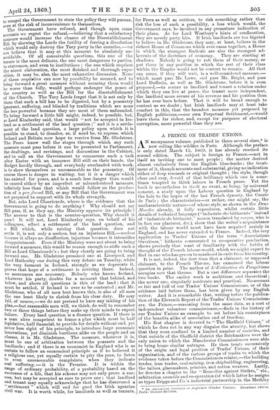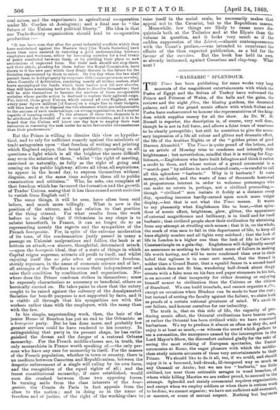A PRINCE ON TRADES' UNIONS.
AN anonymous volume, published in three several sizes,* is now selling like wildfire in Paris. Although the preface is only dated March 15, 1869, it has already reached its second edition. The subject is foreign to France,—not in itself an inviting one to most people ; the matter derived almost exclusively from the English blue-books ; the treatment of it, though accurate and substantial, giving no indication either of deep research or original thought ; the style, though clear and easy, devoid of that brilliancy which one is sometimes tempted to think inborn in French prose. Yet the book is nevertheless in itself an event, as being, by universal consent, a study upon the Labour question in England by the heir to the hopes of the last French dynasty. the Comte de Paris ; the characteristics—or rather, one might say, the uncharacteristic nature—of whose style, as shown in the Dean Mondes already, it fully reproduces, whilst certain little details of technical language ("industrie des batiments" instead of "industrie du biltiment," mason translated by wagon, who is in fact our plasterer, &c.), show that the writer's acquaintance with the labour world must have been acquired mainly in England, and has never extended to France. Indeed, the very application to Trades' Unions of the term "Associations Ouvrieres," hitherto consecrated to co-operative production, shows precisely that want of familiarity with the habits of thought of the French labour-world, which we might expect to find in one who has grown to manhood in exile from his country. It is not, indeed, the first time that a claimant, or supposed claimant, to the French Throne, has examined the labour question in print. The author of L'Estinction du Paupe'ristne occupies now that throne. But a vast difference separates the two books. The earlier work is ambitious and theoretical ; the newer one, singularly moderate and practical. No account so fair and full of our Trades' Unions' Commissions, or of the evidence laid before them, has been given by any English writer. And it is remarkable that, writing before the publication of the Eleventh Report of the Trades' Unions Commissioners, the Prince,—reasoning from the same data, as a sort of independent volunteer commissioner,—finds in the history of our Trades' Unions an example to set before his countrymen of the benefits alike of association and of freedom.
His first chapter is devoted to "The Sheffield Crimes," of which he does not in any way disguise the atrocity, but shows that they were confined to a limited number of societies, and that outside of the Sheffield district the Brickmakers were the
only union to which the Manchester Commissioners were able to bring home similar outrages. He then treats successively of the origin and legal position of Trades' Unions, of their organization, and of the various groups of trades to which the evidence taken before the Commissioners relates,—the building trades, iron trades, coal-mining, iron shipbuilding, engineering,
the tailors, glassmakers, printers, and cotton weavers. Lastly, he devotes a chapter to the "Remedies against Strikes," viz., arbitration councils and co-operation (of which latter he assigns as types Briggs and Co.'s industrial partnership in the Methley coal mines, and the experiments in agricultural co-operation under Mr. Gurdon at Assington); and a final one to "the future of the Unions and political liberty." His idea is that our Trade-Society organization should lead to co-operative production :—
" It has been seen that after the great industrial conflicts which they have maintained against the Masters they [the Trade Societies] have more than once assisted in restoring a good understanding between employers and workmen, either by becoming sureties for a real treaty of peace concluded between them, or by yielding their place to new associations of improved form. But their task should not stop there, and their chiefs, pleading for them before the Royal Commission, have shown to it the new part which they dimly discern in the future for the Societies represented by them to enact. On the day when the law shall permit them to hold property by corporate title (comme personnes morales), when Councils of Arbitration, rendering nearly all strikes useless, shall leave unemployed the funds which their barren cost till now absorbs, they will have something better to do than to dissolve themselves ; they will be able themselves to become the nucleus of those co-operative societies whose pacific action is destined to replace their agitated reign. For, indeed, these great Unions, which extend all over England, which every year figure millions [of francs] on a single line in their budgets, will then have at their disposal the two elements which are indispensable to the success of such undertakings, —a strong organization, and a capital capable of insuring credit. To the absence of these two elements is to be attributed the downfall of most co-operative societies, and it is to be hoped that the Unions will know one day how to employ their vast resources in resuming the task under far more favourable circumstances than their predecessors."
But the Prince is willing to dismiss this view as hypothetical, and to rely for sufficient remedy against the mischiefs of trade antagonism upon "that freedom of writing and printing which England enjoys, that broad publicity, spreading on all questions a light which is all the brighter the more difficult may seem the solution of them," whilst "the right of meeting, exercised as naturally, as fully as the right of going and coming on the public highway, allows all ideas, all aspirations, to appear in the broad day, to express themselves without disguise, and at the same time subjects them all to public examination and criticism." Who, he asks, can complain of that freedom which has favoured the formation and the growth of Trades' Unions, seeing that it has thus caused secret societies to vanish from English soil?
The same things, it will be seen, have often been said before, and much more tellingly. What is new is the position of the utterer, and the relation to that position of the thing uttered. For what results from the work before us is clearly that if Orleanism in any shape is to subsist henceforth in France, it can no longer do so as representing merely the regrets and the sympathies of the French bourgeoisie. For, in spite of the extreme moderation of its tone, of the condemnation justly passed in many a passage on Unionist malpractices and follies, the book is at bottom an attack,—a sincere, thoughtful, determined attack, —upon the bourgeois ideal, that of a state of things in which Capital reigns supreme, attracts all profit to itself, and whilst enjoying itself the no plus ultra of competitive freedom, sternly represses, in the name of economic science and of law, all attempts of the Workers to secure their independence and raise their condition by combination and organization. Nowhere does the Prince condemn strikes in themselves ; some he expressly characterizes as necessary or beneficial, others as heroically carried on. He takes pains to show that the outcry sought to be raised against the solvency of the Amalgamated Societies for benefit purposes is not supported by facts, and it is visible all through that his sympathies are with the workers rather than with the employers, with the many than with the few.
In his simple, unpretending work, then, the heir of the junior House of Bourbon has put an end to the Orleanists as a bourgeois party. But he has done more, and probably few greater services could he have rendered to his country. In extinguishing that party in its present shape, he has extinguished the dream and the danger of a restored Orleans monarchy. For the French middle-classes are, in truth, the only monarchists in France worth speaking of,—the only persons who have any care for monarchy in itself. For the masses of the French population, whether in town or country, there is no medium between Cassmism and Republicanism, between the despotic enforcement of a single will ruling by its own force, and the recognition of the equal rights of all ; and the freest constitutional monarchy, if once established, would soon die crushed between these two opposing forces. In turning aside from the class interests of the bourgeoisie, the Comte de Paris in fact appeals from the class to the nation ; and in doing so in the name of freedom and of justice, of the right of the working-class to
raise itself in the social scale, he necessarily makes that appeal not to the Caesarist, but to the Republican masses
Meanwhile, few things are likely to cause more disquietude both at the Tuileries and at the Elysee than the volume in question, and it looks very much as if the sudden suppression of the Livret,—almost contemporaneous with the Count's preface,—was intended to counteract the effects of the then expected publication, as a bid for the favour of the ouvilers. But the book has held its own, as already intimated, against Caesarism and clap-trap. What next































 Previous page
Previous page